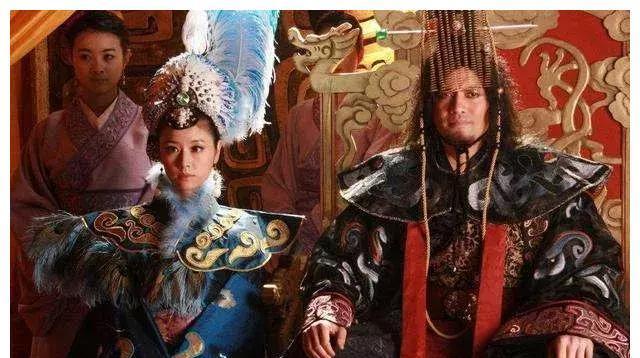
King of Shang
Thanks to the spread of "The Evolution of the Gods" and tv movies, we are no strangers to the history of the alternation of Shang and Zhou. Removing the mythological component, from a historical point of view, the King of Shang was militaristic and tyrannical, and was eventually broken by the combined forces of princes led by King Wu of Zhou, and the Shang Dynasty collapsed.
However, King Wu of Zhou did not exterminate the descendants of the Shang King, but instead gave him the title of Marquis of Shang. The original intention was to use the descendants of the Shang king to appease the Shang people, but he did not expect to die, but he was caused by a rebellion, and he also dragged several younger brothers to participate in it.
Wu Geng
First of all, today's male protagonist Wu Geng, before the fall of the Shang Dynasty, there was no single word about him in the history books. His appearance was after King Wu of Zhou invaded the Shang capital Chaoge, and as the son of King Shang, he was sealed by King Wu of Zhou in the homeland of Chaoge.
After all, at that time, the remnants of the Shang were not completely subordinate to Western Zhou, and there were still a large number of princely states that were not convinced of western Zhou's rule. Therefore, letting Wu Geng rule and manage the remnants of the Shang Dynasty was the best choice at that time.
King Jifa of Zhou Wu
At the same time, in order to prevent Wu Geng's rebellion, King Wu of Zhou divided his brothers around Chaoge, sealed Guan Shuxian in the east of Chaoge, and established the Wei State; sealed Cai Shudu in the southwest of Chaoge and established the State of Huo; and sealed Uncle Huo in the north of Chaoge to establish the State of Huo.
Surrounded by this three sides, they jointly monitored Wu Geng. Although Wu Geng was in the Palace, he was still concerned about the great cause of the restoration of the Shang Dynasty, on the one hand, he quietly maintained contact with the pro-Shang princes in private; on the other hand, he was ready for the restoration at any time, waiting for the time to raise an army to rebel.
Looking at King Wu of Zhou again, after years of hard work, his body finally couldn't hold back. In the fourth year of King Wu's reign, just after holding the founding ceremony in Hojing, he fell ill and finally passed away. He left his 13-year-old son Ji Shu to succeed to the throne as King Cheng of Zhou. Because Ji Shu was still young and could not govern the government, the task of assisting the government fell to King Wu of Zhou's younger brother Zhou Gongdan.
However, Zhou Gongdan was not the eldest of King Wu's younger brothers, so Guan Shuxian, Cai Shudu, and Huo Shudu all expressed dissatisfaction and released news that Zhou Gongdan was trying to usurp the throne, and they had an excuse to rebel. As soon as the news of Zhou Gongdan's usurpation of the throne came out, a large number of people immediately followed the rebellion of the Three Prisons.
Wu Geng was the closest to the position of the Third Prison, and he was also the first to get the news of their rebellion. This was not a godsend, so Wu Geng contacted the three prisoners to discuss the rebellion. Subsequently, he stepped up contact with the pro-Shang princes, especially the Fangguo tribes of Xu, Yan, Bogu, Xiong, and Ying in Dongyi, hoping to take advantage of the unstable rule of Western Zhou and preemptively overthrow Western Zhou. So as to achieve the purpose of restoring the country.
However, these three waves of rebel forces were actually pregnant with ghosts, and although they all wanted to fight against Zhou Gongdan, their purposes were diametrically opposite. The three guan brothers were dissatisfied with the regency of Zhou Gongdan and wanted to use it to compete for power; while the other princes were dissatisfied with Western Zhou's rule and belonged to pure rebellion; Wu Geng was for the purpose of restoring the country. Therefore, this group of rabble-rousers was doomed from the beginning.
Sure enough, Zhou Gongdan, on the orders of King Cheng of Zhou, led the elite division of Western Zhou and went straight to the rebels. The battle was particularly fierce, and in the end, Guan Shuxian was killed in the three prisons, Cai Shudu was exiled, and Uncle Huo was demoted to a commoner.
The other princes also died and fell, and Wu Geng was also killed in this rebellion. After three years of eastern crusades, Zhou Gongdan completely suppressed other rebellious princes, and the Zhou Dynasty was officially unified at this moment, and the great cause of restoring the country of the descendants of the Shang also came to naught!
How do you see Wu Geng's restoration?
The comment area is exchanged